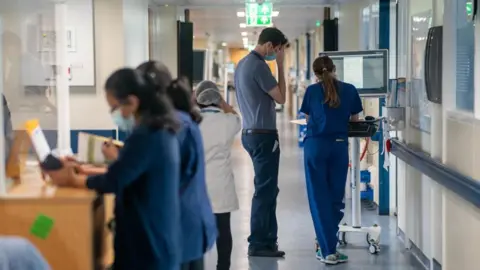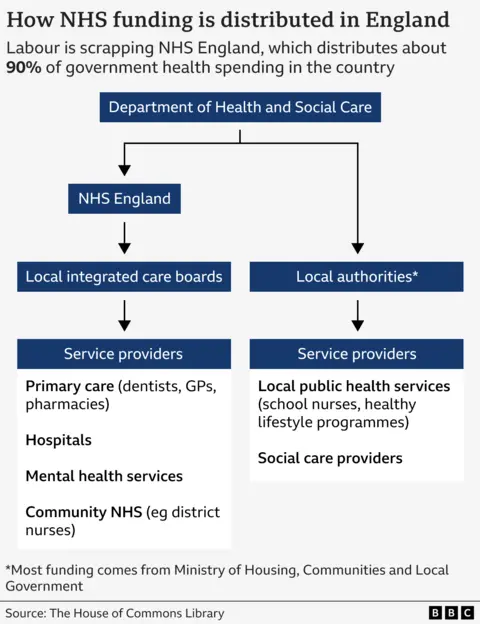Nick TriggleHealth correspondent
 PA Media
PA MediaThousands of NHS staff redundancies in England will now go ahead after a deal was reached with the Treasury to allow the health service to overspend this year to cover the cost of pay-offs.
The government said earlier this year 18,000 admin and managerial jobs would go with NHS England, the body that runs the NHS, being brought into the Department of Health and Social Care alongside cuts to local health boards.
NHS bosses and health ministers had been in talks with the Treasury over how to pay for the £1bn one-off bill with the health service wanting extra money.
The Treasury blocked that, but the BBC understands a compromise has been reached with the NHS permitted to overspend this year.
‘Pragmatic step’
As the job cuts result in savings in future years, the NHS will be expected to recoup the costs further down the line.
Overall, government sources said no extra money is going into the NHS beyond what was agreed at the spending review this year – an extra £29bn a year above inflation by 2028-29.
Health Secretary Wes Streeting told BBC Breakfast that patients and NHS staff had told him the health service had “too many layers of management, too many layers of bureaucracy”.
“People want to see the front line prioritised, and that is exactly what we’re doing,” he said, adding he would tell NHS leaders “we’re finally on the road to recovery” in his speech later on Wednesday.
In a speech to health managers at the NHS Providers’ conference in Manchester later, Streeting is expected to say: “I want to reassure taxpayers that every penny they are being asked to pay will be spent wisely.
“We’re now pushing down on the accelerator and slashing unnecessary bureaucracy, to reinvest the savings in front-line care.
“It won’t happen overnight, but with our investment and modernisation, we will rebuild our NHS so it is there for you when you need it once again.”
According to the government, the reforms will raise £1bn a year by the end of the parliament to improve services for patients.
It said every £1bn saved in bureaucracy costs is enough to fund an extra 116,000 hip and knee operations.
NHS England is expected to be brought back into the Department of Health within two years, while the cuts to integrated care boards (ICBs), which plan health services for individual regions, will reduce their headcounts by 50%.
NHS Providers’ chief executive Daniel Elkeles said: “This is a pragmatic step that means planned redundancies can now go ahead.
“It reflects the flexibility of a three-year settlement, allowing some funding to be brought forward in order to generate future savings to go into front-line care.
“However, we must recognise the position of staff affected by these changes – people who have offered commitment and service to the NHS – who face a very uncertain future.”
But Patricia Marquis of the Royal College of Nursing warned the redundancies could backfire.
“Front-line services need more investment, but to do this off the backs of making thousands of experts redundant is a false economy.
“Expert registered nurses working across NHS England and ICBs don’t just run vital public health programmes and oversee care programmes for the vulnerable – they connect the NHS and social care services with one another.
“To imply these are administrators shows a complete lack of understanding of their roles and how they contribute to patient care.”

Why is NHS England being abolished?
NHS England – the body that runs the NHS in England – was created as part of the 2012 reforms introduced under former Tory health secretary Andrew Lansley.
The idea was to free the health service from political meddling – with ministers instead setting the wider strategy, but stepping back from getting involved on a daily basis.
But Lansley’s successor as health secretary, Jeremy Hunt, said recently NHS England had ended up a “bureaucratic monster” that stifles innovation with reports some organisations were at times filling out 250 forms a month just to satisfy both NHS England and the health department.
And on the front line, one of the most common complaints is that NHS England was incredibly controlling, even requesting individual NHS trusts ask for permission for something as mundane as granting media interviews.
But make no mistake, this is also about control. Ministers have argued it is only right that a democratically-elected government was in charge of day-to-day running of the health service.
But given Labour, in opposition, was critical of the Tories messing around with NHS structures, embarking on its own reorganisation comes with significant risk.
Those working in the health service already talk about the disruption and distraction these changes are causing – and given NHS England oversees the day-to-day running of the health service, organises some specialist services and has a role in training and digital innovation, it is not difficult to see why there are some serious concerns about the reforms.
Streeting told BBC Breakfast that patients and NHS staff had told him the health service had “too many layers of management, too many layers of bureaucracy”.
“People want to see the front line prioritised, and that is exactly what we’re doing,” he said, adding he would tell NHS leaders “we’re finally on the road to recovery” in his speech later on Wednesday.

